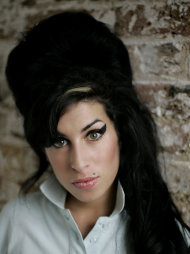
LONDON (AP) — Few artists summed up their own career in a single song — a single line — as well as Amy Winehouse.
"They tried to make me go to rehab," she sang on her world-conquering 2006 single, "Rehab." ''I said 'No, no no.'"
Occasionally, she said yes, but to no avail: repeated stints in hospitals and clinics couldn't stop alcohol and drugs scuttling the career of a singer whose distinctive voice, rich mix of influences and heart-on-her sleeve sensibility seemed to promise great things.
In her short lifetime, Winehouse too often made headlines because of drug and alcohol abuse, eating disorders, destructive relationships and abortive performances. But it's her small but powerful body of recorded music that will be her legacy.
The singer was found dead Saturday at age 27 by ambulance crews called to her home in north London's Camden area, a youth-culture mecca known for its music scene, its pubs — and the availability of illegal drugs.
The London Ambulance Service said Winehouse had died before crews arrived at the house in leafy Camden Square. The cause of death was not immediately known.
 The singer's body was taken from her home by private ambulance to a London mortuary where post-mortem examinations were to be carried out either Sunday or Monday. Police said in a statement no arrests have been made in connection with her death.
The singer's body was taken from her home by private ambulance to a London mortuary where post-mortem examinations were to be carried out either Sunday or Monday. Police said in a statement no arrests have been made in connection with her death.Tony Bennett, who recorded the pop standard "Body And Soul" with Winehouse at London's Abbey Road Studios in March for an upcoming duets album, called her "an artist of immense proportions."
"She was an extraordinary musician with a rare intuition as a vocalist and I am truly devastated that her exceptional talent has come to such an early end," he said.Rolling Stone Ronnie Wood said he was dedicating Saturday's reunion performance of his band The Faces to Winehouse. "It's a very sad loss of a very good friend I spent many great times with," he said.
Winehouse was something rare in an increasingly homogenized music business — an outsized personality and an unclassifiable talent.
She shot to fame with the album "Back to Black," whose blend of jazz, soul, rock and classic pop was a global hit. It won five Grammys and made Winehouse — with her black beehive hairdo and old-fashioned sailor tattoos — one of music's most recognizable stars.
"I didn't go out looking to be famous," Winehouse told the Associated Press when the album was released. "I'm just a musician."
But in the end, the music was overshadowed by fame, and by Winehouse's demons. Tabloids lapped up the erratic stage appearances, drunken fights, stints in hospital and rehab clinics. Performances became shambling, stumbling train wrecks, watched around the world on the Internet.Last month, Winehouse canceled her European comeback tour after she swayed and slurred her way through barely recognizable songs in her first show in the Serbian capital of Belgrade. Booed and jeered off stage, she flew home and her management said she would take time off to recover.
Fans who had kept the faith waited in vain for a followup to "Back to Black."Born in 1983 to taxi driver Mitch Winehouse and his pharmacist wife Janis, Winehouse grew up in the north London suburbs, and was set on a showbiz career from an early age. When she was 10, she and a friend formed a rap group, Sweet 'n' Sour — Winehouse was Sour — that she later described as "the little white Jewish Salt 'n' Pepa."
She attended the Sylvia Young Theatre School, a factory for British music and acting moppets, later went to the Brit School, a performing arts academy in the "Fame" mold, and was originally signed to "Pop Idol" svengali Simon Fuller's 19 Management.
But Winehouse was never a packaged teen star, and always resisted being pigeonholed.Her jazz-influenced 2003 debut album, "Frank," was critically praised and sold well in Britain. It earned Winehouse an Ivor Novello songwriting award, two Brit nominations and a spot on the shortlist for the Mercury Music Prize.
But Winehouse soon expressed dissatisfaction with the disc, saying she was "only 80 percent behind" the album.
"Frank" was followed by a slump during which Winehouse broke up with her boyfriend, suffered a long period of writer's block and, she later said, smoked a lot of marijuana.
"I had writer's block for so long," she said in 2007. "And as a writer, your self-worth is literally based on the last thing you wrote. ... I used to think, 'What happened to me?'
"At one point it had been two years since the last record and (the record company) actually said to me, 'Do you even want to make another record?' I was like, 'I swear it's coming.' I said to them, 'Once I start writing I will write and write and write. But I just have to start it.'"
The album she eventually produced was a sensation.Released in Britain in the fall of 2006, "Back to Black" brought Winehouse global fame. Working with producers Mark Ronson and Salaam Remi and soul-funk group the Dap-Kings, Winehouse fused soul, jazz, doo-wop and, above all, a love of the girl-groups of the early 1960s with lyrical tales of romantic obsession and emotional excess.
"Back to Black" was released in the United States in March 2007 and went on to win five Grammy awards, including song and record of the year for "Rehab."
Music critic John Aizlewood attributed her trans-Atlantic success to a fantastic voice and a genuinely original sound.
"A lot of British bands fail in America because they give America something Americans do better — that's why most British hip-hop has failed," he said. "But they won't have come across anything quite like Amy Winehouse."
Winehouse's rise was helped by her distinctive look — black beehive of hair, thickly lined cat eyes, girly tattoos — and her tart tongue.She was famously blunt in her assessment of her peers, once describing Dido's sound as "background music — the background to death" and saying of pop princess Kylie Minogue, "she's not an artist ... she's a pony."
The songs on "Black to Black" detailed breakups and breakdowns with a similar frankness. Lyrically, as in life, Winehouse wore her heart on her sleeve."I listen to a lot of '60s music, but society is different now," Winehouse said in 2007. "I'm a young woman and I'm going to write about what I know."
Even then, Winehouse's performances were sometimes shambolic, and she admitted she was "a terrible drunk."
Increasingly, her personal life began to overshadow her career.
She acknowledged struggling with eating disorders and told a newspaper that she had been diagnosed as manic depressive but refused to take medication. Soon accounts of her erratic behavior, canceled concerts and drink- and drug-fueled nights began to multiply.
Photographs caught her unsteady on her feet or vacant-eyed, and she appeared unhealthily thin, with scabs on her face and marks on her arms.
There were embarrassing videos released to the world on the Internet. One showed an addled Winehouse and Babyshambles singer Pete Doherty playing with newborn mice. Another, for which Winehouse apologized, showed her singing a racist ditty to the tune of a children's song.Winehouse's managers went to increasingly desperate lengths to keep the wayward star on the straight and narrow. Before a June 2011 concert in Belgrade — the first stop on a planned European comeback tour — her hotel was stripped of booze. It did no good,
Winehouse swayed and slurred her way through barely recognizable songs, as her band played gamely and the audience jeered and booed.
Winehouse flew home. Her management canceled the tour, saying Winehouse would take some time off to recover.Though she was often reported to be working on new material, fans got tired of waiting for the much-promised followup to "Back to Black."
Occasional bits of recording saw the light of day. Her rendition of The Zutons' "Valerie" was a highlight of producer Mark Ronson's 2007 album "Version," and she recorded the pop classic "It's My Party" for the 2010 Quincy Jones album "Q: Soul Bossa Nostra."
But other recording projects with Ronson, one of the architects of the success of "Back to Black," came to nothing.
She also had run-ins with the law. In April 2008, Winehouse was cautioned by police for assault after she slapped a man during a raucous night out.
The same year she was investigated by police, although not charged, after a tabloid newspaper published a video that appeared to show her smoking crack cocaine.
In 2010, Winehouse pleaded guilty to assaulting a theater manager who asked her to...Read more.





 7/23/2011 10:19:00 PM
7/23/2011 10:19:00 PM
 live news
live news













0 commentaires:
Post a Comment